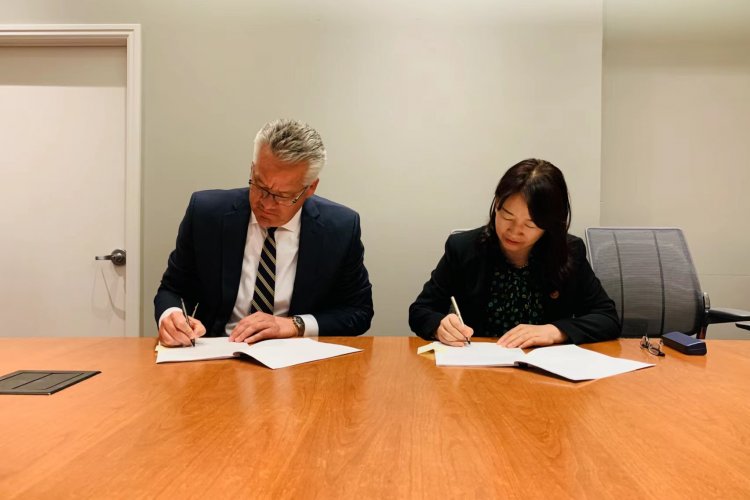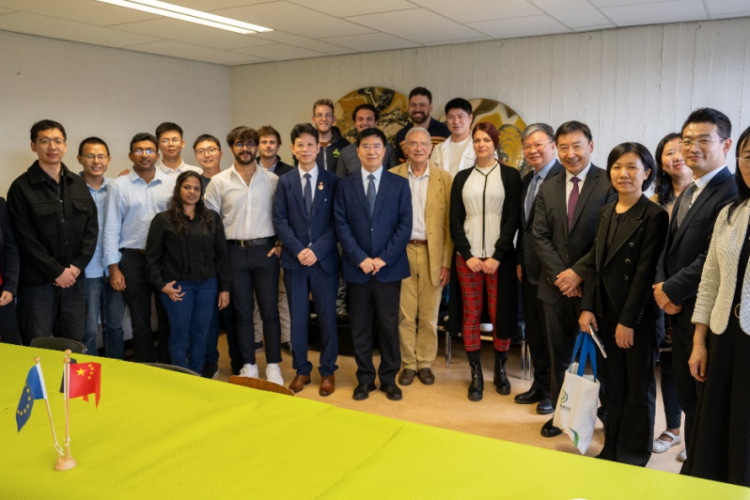
Asfa Batool, a Pakistani postdoctoral fellow, does an experiment at a laboratory of the college of ecology in Lanzhou University in Lanzhou, northwest China's Gansu Province, Aug. 29, 2023. (Xinhua/Guo Gang)
LANZHOU, Sept. 6 (Xinhua) -- Asfa Batool, a Pakistani postdoctoral fellow at Lanzhou University in northwest China's Gansu Province, is conducting dryland agricultural research in China. Her aim is to leverage her knowledge and different technologies to increase the grain production in Pakistan.
Asfa has been a part of Lanzhou University since 2012, when she first arrived to pursue her master's degree. Over the course of 11 years, she successfully obtained her doctoral degree in ecology in 2018, before starting her postdoctoral research at the university.
While talking about her experiences studying in China, she expressed immense gratitude towards her advisor, Xiong Youcai, a professor at the college of ecology at Lanzhou University. Xiong had previously given a lecture during her undergraduate studies at the University of Agriculture Faisalabad, Pakistan and introduced Chinese dryland agriculture and water saving technology.
Asfa was inspired by Chinese agricultural technologies and hoped to learn from him to improve the current state of agriculture in Pakistan.
Sponsored by the Chinese government scholarship, she applied to be a graduate student at Lanzhou University and began her study under professor Xiong in 2012. She has been actively involved in research work focusing on agriculture and biotechnologies to improve plant growth and productivity.
"Chinese dryland agricultural technology provides a potential innovative approach to upgrade the productivity of crops in arid and semi-arid regions. It is a key solution to boost the agricultural production system, and Lanzhou University is a well-known institute in China for agriculture studies. That's why I chose to study here," said Asfa, adding that she hopes that Chinese technologies can be utilized in Pakistan, because dry areas in Pakistan need more attention, as the crops there rely solely on rainfall.
According to Xiong Youcai, Chinese dryland agricultural technology can not only avoid resource waste and effectively save water but also improve soil fertility and reduce evaporation at the soil surface. The most important aspect of this technology is the easiness of use and low costs.
With Xiong's support, such as helping her set up research objectives, providing lab facilities and the funding projects provided by Lanzhou University, Asfa has conducted a lot of research on wheat and maize. This includes conducting split root experiments to study the role of phytohormones in drought stress. She also applied China's water-saving technology to maize and wheat planting experiments in Pakistan.
"I learned that how flat planting and ridge furrow planting can help Pakistan to increase the yield and the crop productivity there, compared Chinese technology with the local planting technology, and also especially focused on how the poor people like local farmers can increase their yield and get benefits from Chinese technology," said Asfa.
Based on experiments and research, she said she believes that China's ridge and furrow mulching technology, a part of dryland agriculture, can produce more yield than flat planting. While conducting experiments in dry areas in Pakistan, she felt confident that her implementation of the technology would lead to excellent results.
She has also visited many places in Gansu Province where local farmers applied the water saving technology to get a harvest and feed their families.
For her, China has really made unremitting efforts to help the poor people to have a good life. "That's what Pakistan needs," Asfa said, adding that she really wants to take Chinese agricultural technology back to Pakistan to benefit more local farmers and improve their life quality.
She has also actively communicated with scientists in China, Africa, Australia and Pakistan. Serving as a volunteer, she has helped participants with their accommodation and participation at many international forums and meetings hosted by Lanzhou University.
"These were all impressive experiences because they provide a platform for me to share and communicate different ideas among the people who come from different parts of the world," said Asfa.
Asfa said she is eager to implement Chinese agricultural technologies in the farmland in Pakistan after graduation, and hopes for deepened cooperation between China and Pakistan in more fields.

Asfa Batool, a Pakistani postdoctoral fellow, studies on campus at Lanzhou University in Lanzhou, northwest China's Gansu Province, Aug. 29, 2023.
(Xinhua/Guo Gang)

Asfa Batool, a Pakistani postdoctoral fellow, does an experiment at a laboratory of the college of ecology in Lanzhou University in Lanzhou, northwest China's Gansu Province, Aug. 29, 2023. (Xinhua/Guo Gang)




